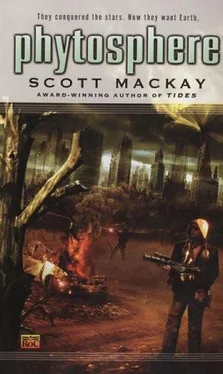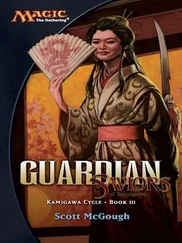“That fone’s a hunk of junk,” said Jake. “You should have rented a better one.”
“With whose money, Jake?”
“I’m leaving a note,” said Hanna.
“No, you’re not.”
“We could leave a note with a clue in it,” suggested Jake. “Something only Dad would understand. We wouldn’t have to spell out that we were going to Marblehill.”
“And what if he doesn’t get the clue?” said Hanna. “You’re such an idiot sometimes, Jake.”
“Come on,” said Glenda. “We’re all tired. And we’re frazzled. Let’s just get to Marblehill. Don’t you want to go there and see your cousins? Didn’t you have fun there last summer and the summer before?
And Uncle Neil is bound to have a fone, and a much better one than this. So let’s just forget about the note. Let’s pack, get in the car, and go to the nursing home so we can recharge. Before Buzz comes back.”
She watched her daughter every step of the way. Hanna sullenly disassembled her clarinet—doctor-recommended for her asthma—in the light of one of the flashlights and put it into its case. She then packed some makeup, and a bag full of clothes, commenting on how Melissa and Ashley were going to make fun of her cheap, bargain-brand clothes, and finally finished by taking five puffs of her inhaler.
“Honey, don’t overdo that stuff.”
“Mom, fuck off.”
Glenda didn’t punish Hanna for saying this. She just went through the motions, and started packing.
Hanna broke down and cried, even though she was zoned out on her bronchodilator. She came into her mother’s arms, and told her she was sorry for saying fuck off. But that didn’t stop Glenda from checking Hanna’s room one last time for a note, and checking it thoroughly.
She at last got into the car with her kids, like they were going on a summer vacation, and as she headed out on the road, she looked up at the sky. And saw that the Moon had finally disappeared behind the western edge of the shroud’s toxic wound. She felt lonely then. She didn’t know if she was ever going to see Old Hill again. She didn’t know if she was going to see North Carolina.
But most of all, she didn’t know if she was going to see Gerry again.
Glenda saw the blaze a mile down the road, and knew that Cedarvale Nursing Home was burning.
The flames raged among the tall, dead trees, and they were thick and orange and capped with plumes of dark smoke. She was afraid the road to the underground garage might be blocked, that a recharge would be impossible, and that their plans for driving to Marblehill would come to nothing. But as she got closer she saw that only the Mercer and Dawes wings were on fire, and that the Hutchley wing, where the administrative offices, Palliative Care Department, and underground parking lot were, had yet to be touched.
She slowed the car as she came to the front gate. The smell of smoke scraped the inside of her nostrils.
She saw a boy of ten or eleven run out from behind the security kiosk, his face smeared with dirt, his clothes caked with filth, so skinny and underfed that Glenda wondered how he had the strength to run.
But run he did, along the front of the Hutchley wing and the Dawes wing, finally disappearing around the hulk of the burning Mercer wing.
Glenda glanced at Hanna, who sat in the front seat beside her, then over her shoulder at Jake, who was in the back with the handgun held loosely on his knee. “Stay alert.”
“I know that guy,” said Jake as he peered after the boy. “He goes to Talbot Public.”
Not trusting her own eyes because she was forty now, she asked Jake, “Did he have a gun?”
“He had something in his belt,” said Jake. “I couldn’t see what it was. It looked like a stick.”
“But you’re sure it wasn’t a gun.”
“It looked like a stick.”
She nodded. “We go in, we go out.”
“I think his name is Buck,” said Jake.
“Buck?” said Hanna.
“That’s what I’ve heard other kids call him.”
Glenda eased her foot off the brake and rolled into the complex. “I don’t like this. Maybe we should come back later.”
“Mom, let’s keep going,” said Hanna. “Let’s get it over with.”
“Buck, or whatever his name is, maybe ran off to alert the rest of those kids I was telling you about. The ones Whit was so worried about.”
“So let’s be fast,” said Hanna. “In and out, like you said. And Jake, for Christ’s sake, don’t be afraid to shoot someone for a change.”
“Mom, she’s bugging me again.”
“Hanna, please stop bugging your brother.”
“I’m not bugging him. I’m just stating facts.”
“Okay, I’ll shoot someone. I guarantee it. And it just might be you.”
“Let’s calm down,” said Glenda. “We go in, we get our charge, and we leave.”
She eased past the security kiosk, veered left around the sign that said UNDERGROUND PARKING GARAGE—STAFF AND RESIDENT PARKING ONLY, and drove down the ramp, feeling the heat of the night even though the air conditioner was on full tilt. She ventured into the underground parking lot and followed the big white arrows. The place was dark. She was worried that the charger might be off-line, even though it operated independently from the main grid, but as she got to the second level she saw that, miracle of miracles, its indicator light was still flashing green, a welcome beacon, and that she could recharge her car after all.
“This place is spooky,” said Hanna.
“Won’t it be nice to go for a swim in Uncle Neil’s pool?” Glenda said, trying to reassure her daughter. “I sure would like a good cooldown.”
She pulled up to the generator.
Jake shifted in the back. “Mom, I’m going to stand over by that pillar to cover you.”
“Jake, never shoot that thing if Hanna or I are in your way.”
“Mom, I’ve thought a lot about using this gun. Just trust me.”
The three Thorndikes got out of the car.
Jake took up his position behind the pillar.
Hanna coughed and wheezed in the close, thick air of the underground parking lot.
Glenda keyed in the sequence to the charging port, then went to the generator and entered her user name and password. The machine identified her, and itemized for her the output available—more than enough to fill her car. She took the generator’s male hookup and inserted it into her car’s female port, selected recharge, then hit enter. The generator hummed softly. Its computer linked up with her car’s onboard software and, glancing at the dash, she saw the little blue bar move slowly forward.
The bar was halfway across when she heard a slow and steady whistle from behind Jake’s pillar. She looked up. She saw the flicker of firelight at the other end of the garage, and in a moment several figures emerged, all carrying homemade torches. Those kids again. It finally dawned on her why these kids had set the Mercer and Dawes wings on fire—they wanted light. They couldn’t live in the dark anymore.
She counted five altogether. They didn’t walk. They swaggered the way kids swagger when they are acting tough. And in their toughness they neglected caution, and failed to consider that Jake might be standing behind the pillar with a gun.
When the boys finally reached Glenda and Hanna, a tall one in a denim jacket looked at them as if he had lifted a rock and found bugs underneath. Then he turned to another boy, the one they had seen run from behind the security kiosk. “Buck, check the car.”
Buck came forward.
Glenda reached into the front seat and lifted her rifle. She didn’t point it at Buck. She pointed it at Denim Jacket, the leader, instead. She watched the three flanking boys lose their absurd expressions of toughness and grow suddenly concerned that the lady with the car should have such a big, mean-looking rifle.
Читать дальше












